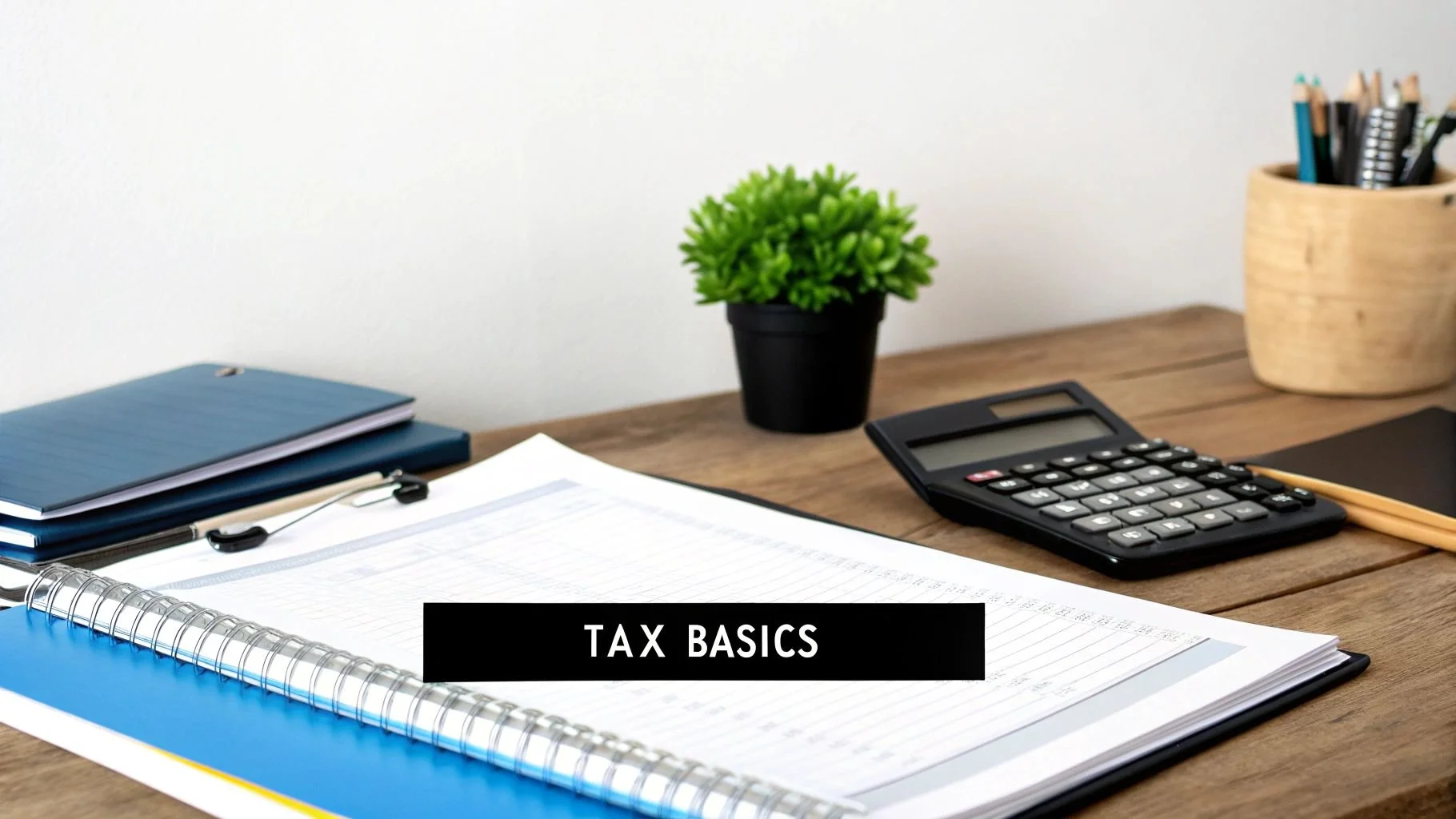Expert Help with Back Taxes: Your IRS Relief Guide
The Reality of Back Taxes: What You're Really Facing
Facing back taxes can be incredibly stressful. It's a complex issue shrouded in uncertainty, leaving many feeling lost and overwhelmed. Let's clarify this challenging situation and break down exactly what you're dealing with. Understanding how back taxes accrue and the potential ramifications is the first step towards resolving the problem.
Understanding the Basics of Back Taxes
Back taxes are any taxes owed to the IRS or state that remain unpaid after the filing deadline. This encompasses various taxes, including income tax, payroll tax, and sales tax.
Many people mistakenly believe that back taxes result solely from intentional tax evasion. However, various life circumstances often contribute to taxpayers falling behind.
Financial hardship, job loss, or unexpected medical bills can make paying taxes on time difficult. The tax code's complexity can also lead to unintentional errors or misunderstandings, especially for self-employed individuals and small business owners.
This can result in underpayment or failure to file, both of which contribute to accumulated back taxes.
The Difference Between Unfiled Returns and Unpaid Taxes
Understanding the distinction between unfiled tax returns and unpaid tax assessments is crucial. Unfiled returns signify that the required tax forms haven't been submitted to the IRS by the deadline.
Unpaid assessments occur when you file your return, but don't pay the taxes owed. Each situation presents unique challenges.
Unfiled returns lead to penalties for failure to file, while unpaid taxes incur penalties for failure to pay. These penalties and interest can quickly escalate, transforming a manageable tax issue into a significant financial burden.
The longer you wait, the more the debt increases, making prompt action essential. The U.S. tax gap, the difference between taxes owed and taxes paid, was estimated at $696 billion in 2022, illustrating how widespread this issue is.
➥ Learn more about the tax gap and its implications.
Common Causes of Back Tax Problems
To better understand the reasons behind back taxes, let's look at some common scenarios. The following table provides further details about the causes and their potential repercussions.
Common Causes of Back Tax Problems
| Cause | Description | Potential Consequences |
|---|---|---|
| Financial Hardship | Unexpected job loss, medical expenses, or other financial emergencies. | Penalties, interest accrual, wage garnishment, liens. |
| Unintentional Errors | Mistakes in tax calculations, deductions, or credits. | IRS notices, penalties, interest accrual, audits. |
| Lack of Understanding | Confusion about tax laws, filing requirements, or payment options. | Penalties, interest accrual, potential audits. |
| Procrastination or Avoidance | Delaying filing or payment due to fear or overwhelm. | Increased penalties, interest, collection actions. |
As you can see, various factors can contribute to back tax issues, and the consequences can be serious. Addressing these issues as soon as possible is key to minimizing the impact on your finances.
Finding Help and Taking Control
Regardless of how long your tax problems have persisted, there are solutions available. Taking charge of your situation is empowering.
➥ Learn more about how to face your tax debt and explore options.
Understanding your reality allows you to take control of your finances and seek the appropriate help to navigate the complexities of back taxes.
Don’t let fear hold you back. Taking action is the first step towards resolving your tax issues, which is often more manageable than it initially seems.
Inside the IRS Collection Machine: Navigating the Process
Behind those often-intimidating IRS notices is a systematic collection process. Understanding how it works can help you navigate your situation more effectively.
This section will guide you through the IRS collection timeline, from the initial contact to potential enforcement actions, and provide clarity on what to expect.
Understanding the Collection Timeline
The IRS collection process usually starts with a series of notices. These notices, which become increasingly urgent, outline the amount you owe, payment deadlines, and the potential consequences if you don't pay.
For example, the first notice might be a simple payment reminder, while later notices could warn of more serious actions. This phased approach gives you multiple opportunities to address the debt before things escalate.
It's also important to understand the specific meaning and urgency of each notice. Some are informational, while others require immediate action.
Recognizing these differences helps you prioritize your response and avoid unnecessary stress.
➥ You can learn more about these notices here: Understanding IRS Notices.
Escalation and Enforcement
The IRS typically begins by simply requesting payment. However, if these requests are ignored, the IRS can escalate to enforcement actions. This can include filing a Notice of Federal Tax Lien, which essentially secures the government's claim against your assets.
A further escalation could result in a levy, where the IRS actually seizes assets to satisfy the debt. A common type of levy is wage garnishment, where a portion of your wages goes directly to the IRS.
However, there are several opportunities to intervene before these serious collection actions occur. Understanding the escalation process helps you identify where you stand and take the necessary steps to prevent further complications.
IRS Initiatives and Focus
The IRS is always adapting its collection strategies. Under the Inflation Reduction Act, the IRS launched a new initiative focused on collecting past-due tax debt from high-income, high-wealth individuals.
This initiative has already recovered over $1 billion as of mid-2024.
This effort targets taxpayers with over $1 million in income and $250,000 or more in recognized tax debt.
The campaign aims to improve tax fairness and ensure all taxpayers, especially the wealthy, fulfill their tax obligations. Learn more about this initiative at the Treasury Department's website.
Decoding the Bureaucracy
Navigating the IRS collection process can be confusing. However, with a clear understanding of the process, timelines, and options for help with back taxes, you can take control of the situation.
This knowledge empowers you to respond effectively to notices, understand your rights, and take the appropriate steps toward a resolution.
Seeking professional help can often simplify the process and potentially minimize the long-term financial impact of back taxes.
Finding Legitimate Help With Back Taxes: Expert Selection
Dealing with IRS collections can be incredibly stressful. Many taxpayers find themselves seeking professional help to navigate back taxes.
But it's crucial to remember that not all tax professionals possess the same level of expertise when it comes to resolving IRS debt. Choosing the right expert is paramount to achieving a successful resolution.
Understanding The Different Types Of Tax Professionals
Several types of tax professionals can assist with back taxes, each with varying specializations. Tax attorneys, CPAs, enrolled agents, and tax resolution firms all offer distinct services.
Tax attorneys, for instance, specialize in legal representation and can deftly handle complex tax litigation. CPAs excel in financial analysis and tax planning, making them valuable assets in offer in compromise negotiations.
Enrolled agents are federally authorized tax practitioners specifically focused on IRS representation. They handle a broad spectrum of tax issues, including audits, collections, and appeals.
Tax resolution firms often bring a team of experts to the table, including attorneys, CPAs, and enrolled agents, offering a more comprehensive range of services.
Evaluating Credentials And Experience
When selecting a tax professional, don't stop at basic credentials. Look for specific skills and experience in effective resolution.
Inquire about their history with similar cases, especially those involving audit representation, penalty abatement requests, or offers in compromise.
Understanding their communication approach with the IRS is essential. A skilled professional knows how to negotiate effectively and advocate strongly for their clients. Request client testimonials or case studies to get a sense of their success rate and client satisfaction.
Recognizing Red Flags And Avoiding Scams
Unfortunately, the tax resolution field has its share of scams. Be cautious of professionals who guarantee specific outcomes, promise unbelievably low fees, or exert pressure to sign a contract quickly. These are major red flags indicating a potential scam.
A legitimate tax professional will thoroughly analyze your situation before discussing fees or suggesting a course of action. They'll also be transparent about the potential risks and challenges your case may present.
Realistic Fee Structures And Essential Questions
Fee structures vary depending on the complexity of the case. A reputable professional will always provide a clear explanation of their fees upfront. Be wary of unusually low or high fees, and request a detailed breakdown of included services.
Before hiring, ask key questions to gauge experience and expertise. Inquire about their experience with specific IRS programs like installment agreements or penalty abatement. Also, ask about their communication strategy with the IRS and their approach to resolving difficult tax issues.
Comparing Tax Professionals
To help you choose the right professional for your needs, the following table summarizes the key differences between the types of tax professionals who can assist with back taxes:
Tax Professional Comparison for Back Tax Help: This table compares different types of tax professionals who can assist with back taxes, their qualifications, and when to use each.
| Professional Type | Qualifications | Best For | Typical Cost Range |
|---|---|---|---|
| Tax Attorney | Licensed attorney specializing in tax law | Complex tax litigation, audit representation, criminal tax defense | Varies widely based on complexity and attorney's experience |
| CPA | Certified Public Accountant | Financial analysis, tax planning, Offer in Compromise negotiations | Hourly rates or flat fees depending on services |
| Enrolled Agent | Federally authorized tax practitioner | IRS representation, audits, collections, appeals | Hourly rates or flat fees depending on services |
| Tax Resolution Firm | Employs a team of tax professionals | Comprehensive tax resolution services, various tax issues | Varies widely depending on services and firm's experience |
This table clarifies the strengths of each professional type. Choosing the right professional hinges on your specific tax situation and needs.
By understanding the nuances of tax resolution, recognizing red flags, and asking the right questions, you can select a qualified professional to effectively represent you and guide you toward a successful resolution of your back tax issues.
Self-Resolution Vs. Professional Help With Back Taxes
Deciding how to handle your back taxes – on your own or with professional help – is a big decision. It can have a real impact on your financial future. This section will help you understand the factors involved in making this choice.
When DIY Might Be An Option
Sometimes, handling back taxes yourself is possible. If you have simple unfiled returns and expect a refund, you might be able to manage without professional help. Likewise, if you missed a payment and can fix it quickly, self-resolution might work.
However, even seemingly simple tax situations can get tricky. This is especially true if you're not sure about tax laws or have multiple years of unfiled returns. Be honest about your understanding of tax rules and your ability to handle IRS procedures.
The Benefits of Professional Help With Back Taxes
Complicated tax situations, like significant business tax debt or trust fund recovery penalties, often need professional guidance.
Experienced tax professionals know the tax code inside and out and can create a plan just for you.
➥ You might be interested in: How to master IRS negotiations.
For example, a tax professional can negotiate with the IRS for you. They might be able to reduce penalties, set up a payment plan, or explore options like an Offer in Compromise.
This expertise can save you money in the long run, making the cost of professional help worthwhile.
The average income tax rate varies greatly. In 2021, the top 1% paid 25.9%, while the bottom 50% paid only 3.3%. You can find detailed statistics here.
Factors To Consider In Your Self-Assessment
Several things can help you choose the best approach for your tax situation. The kind of communication you’ve received from the IRS, how complex your returns are, and your comfort level with negotiation are all key factors.
Here's a breakdown:
IRS Communication: Have you received a notice of lien or levy? This could mean you need professional help.
Complexity of Returns: Are your returns simple or complex? Complex returns often involve business transactions, investments, or international income.
Negotiation Skills: Are you comfortable negotiating with the IRS? Professionals often achieve better results than taxpayers negotiating alone.
Cost Vs. Long-Term Savings
Professional help costs money upfront, but can lead to big savings later. Professionals can help you minimize penalties, negotiate interest abatement, and find the best strategy to lower your overall tax bill. This can be very helpful in complex situations.
Carefully consider these factors to decide whether to handle your back taxes yourself or get professional help. Making the right choice is important for your financial well-being.
IRS Resolution Programs: Finding Your Path to Tax Freedom
Dealing with back taxes can be stressful, but understanding the available IRS resolution programs can help you regain control of your finances.
The IRS offers several options designed to help taxpayers resolve their tax debt, each with its own set of qualifications and benefits. Let's explore these options.
Installment Agreements: Managing Your Debt Over Time
An Installment Agreement lets you pay back taxes in monthly installments, making the debt more manageable. The IRS offers different types of installment agreements to suit various financial situations.
Streamlined Installment Agreement: This option is typically available if you owe less than $50,000, including tax and penalties. It requires less paperwork and offers faster approval.
Guaranteed Installment Agreement: If you owe $10,000 or less and meet certain criteria, you qualify for a guaranteed installment agreement, ensuring a payment plan regardless of your financial situation.
Partial Payment Installment Agreement: This option lets you pay less than the full amount each month if your finances prevent full payment. The IRS calculates this based on your ability to pay.
Each installment agreement has specific documentation requirements and post-resolution compliance obligations. Understanding these is crucial for successful completion.
Offer in Compromise (OIC): Settling for Less Than You Owe
An Offer in Compromise (OIC) allows you to settle your tax debt for less than the full amount. This program considers your ability to pay, income, expenses, and asset equity.
The IRS evaluates OIC applications based on strict criteria, analyzing your financial situation to determine if a reduced amount is justified. Understanding these factors is key to a successful offer.
A successful OIC depends on accurately representing your financial situation and providing all necessary documentation.
This program can provide significant relief for those facing substantial tax debt, but it requires careful preparation and a realistic assessment of your finances.
Currently Not Collectible (CNC) Status: Temporary Relief When You Can't Pay
Currently Not Collectible (CNC) status is a temporary option for taxpayers facing extreme financial hardship, preventing them from paying current or future tax liabilities. CNC status doesn't eliminate the debt, but it suspends collection activities like levies and garnishments.
While often a last resort, CNC status can be a helpful tool for taxpayers with temporary financial difficulties. It provides time to improve their financial situation while preventing further escalation of tax problems.
CNC status has ongoing compliance requirements and is usually reviewed annually to ensure your financial situation still qualifies.
Penalty Abatement: Reducing Your Overall Tax Liability
Penalty abatement requests can significantly reduce your overall tax burden. The IRS may waive or reduce penalties for several reasons, including reasonable cause, first-time abatement, or statutory exceptions.
To effectively request penalty abatement, you must provide documented evidence of the reason for the penalty. This might include documentation of unexpected life events, errors by tax professionals, or other valid reasons. A successful penalty abatement request can significantly reduce the total amount owed.
These IRS resolution programs offer valuable options for taxpayers struggling with back taxes. Understanding these programs and seeking professional advice can help you achieve a successful resolution and lasting financial freedom.
Choosing the right program depends on your specific financial situation and understanding the various program requirements.
Your Back Tax Action Plan: From Overwhelmed to Organized
Transforming tax anxiety into strategic progress starts with a clear roadmap. This plan breaks down a potentially overwhelming situation into manageable steps designed to produce results, no matter your tax circumstances.
Organize and Assess: Taking Stock of Your Situation
The first step is getting organized. Gather all your tax documents, including IRS notices, prior-year returns, and income and expense records. Create a central repository for everything tax-related.
Think of it as building a foundation for your resolution strategy. A dedicated folder, binder, or digital system can help you store and access these documents easily.
Next, determine your filing requirements across multiple tax years. Identify missing returns and outstanding tax debts.
Honestly assess where you stand with the IRS. This assessment clarifies the scope of your task and is key to developing an effective action plan.
Reconstruct Missing Information: Filling the Gaps
If you’re missing tax documents, focus on reconstructing the necessary information. Request wage and income transcripts from the IRS.
Gather bank statements, credit card records, and other financial documentation. Consult previous employers or clients to obtain missing income information.
Even partial information is helpful in reconstructing returns and preventing further complications. This gathering process is crucial for accurate filing and demonstrating a proactive approach to resolving your tax situation.
Communicate Strategically: Effective IRS Interaction
Effective communication with the IRS is essential. When contacting them, be clear, concise, and respectful. Use precise language to explain your situation and request assistance. Avoid vague terms or making promises you can’t keep.
Keep records of all communications, including phone calls, emails, and letters. This documentation helps avoid misunderstandings and provides a clear record of your interactions.
For example, respond promptly and professionally to any IRS document requests, providing the information in an organized manner. This demonstrates your commitment to resolving your situation.
Select and Implement Your Resolution Strategy: Taking Action
With a clear understanding of your situation, you can choose the best resolution strategy. This might involve an Installment Agreement, an Offer in Compromise, or other IRS programs. Work with a qualified tax professional to evaluate your options and develop a tailored plan.
A well-defined plan includes specific steps, timelines, and milestones to track your progress. This focused approach empowers you to regain control and systematically resolve your back taxes.
Establish Ongoing Compliance: The Foundation for Future Success
After resolving your back taxes, maintain ongoing compliance. This involves filing and paying your taxes on time every year. Stay organized, keep accurate records, and seek professional advice when needed.
Maintaining compliance not only avoids future tax problems, but also preserves your peace of mind. Consider a system for tracking tax deadlines and making estimated tax payments.
This proactive approach prevents future liabilities and builds a strong foundation for financial health. This commitment to compliance provides security and empowers you to control your financial future.
➥ Contact Attorney Stephen A. Weisberg for a free Tax Debt Analysis.
Contact Me Here: https://www.weisberg.tax/contact-1
Email: sweisberg@wtaxattorney.com
Phone/Text: (248) 971-0885
Address: 300 Galleria Officentre, Suite 402, Southfield, MI 48034



